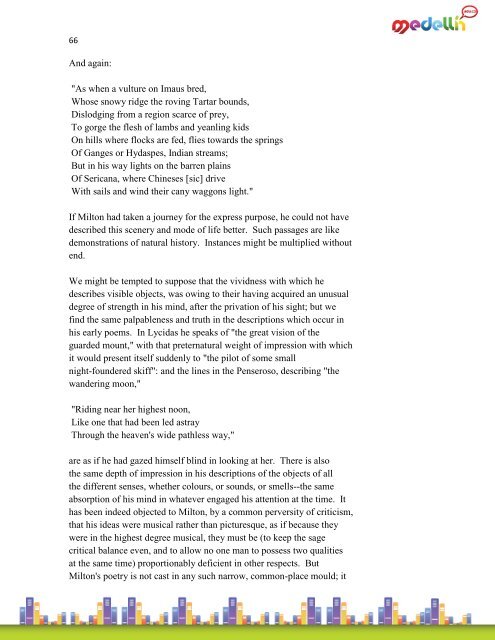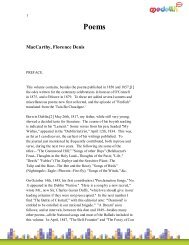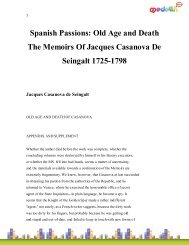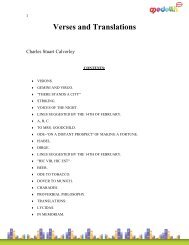Lectures On The English Poets William Hazlitt
Lectures On The English Poets William Hazlitt
Lectures On The English Poets William Hazlitt
You also want an ePaper? Increase the reach of your titles
YUMPU automatically turns print PDFs into web optimized ePapers that Google loves.
66<br />
And again:<br />
"As when a vulture on Imaus bred,<br />
Whose snowy ridge the roving Tartar bounds,<br />
Dislodging from a region scarce of prey,<br />
To gorge the flesh of lambs and yeanling kids<br />
<strong>On</strong> hills where flocks are fed, flies towards the springs<br />
Of Ganges or Hydaspes, Indian streams;<br />
But in his way lights on the barren plains<br />
Of Sericana, where Chineses [sic] drive<br />
With sails and wind their cany waggons light."<br />
If Milton had taken a journey for the express purpose, he could not have<br />
described this scenery and mode of life better. Such passages are like<br />
demonstrations of natural history. Instances might be multiplied without<br />
end.<br />
We might be tempted to suppose that the vividness with which he<br />
describes visible objects, was owing to their having acquired an unusual<br />
degree of strength in his mind, after the privation of his sight; but we<br />
find the same palpableness and truth in the descriptions which occur in<br />
his early poems. In Lycidas he speaks of "the great vision of the<br />
guarded mount," with that preternatural weight of impression with which<br />
it would present itself suddenly to "the pilot of some small<br />
night-foundered skiff": and the lines in the Penseroso, describing "the<br />
wandering moon,"<br />
"Riding near her highest noon,<br />
Like one that had been led astray<br />
Through the heaven's wide pathless way,"<br />
are as if he had gazed himself blind in looking at her. <strong>The</strong>re is also<br />
the same depth of impression in his descriptions of the objects of all<br />
the different senses, whether colours, or sounds, or smells--the same<br />
absorption of his mind in whatever engaged his attention at the time. It<br />
has been indeed objected to Milton, by a common perversity of criticism,<br />
that his ideas were musical rather than picturesque, as if because they<br />
were in the highest degree musical, they must be (to keep the sage<br />
critical balance even, and to allow no one man to possess two qualities<br />
at the same time) proportionably deficient in other respects. But<br />
Milton's poetry is not cast in any such narrow, common-place mould; it

















